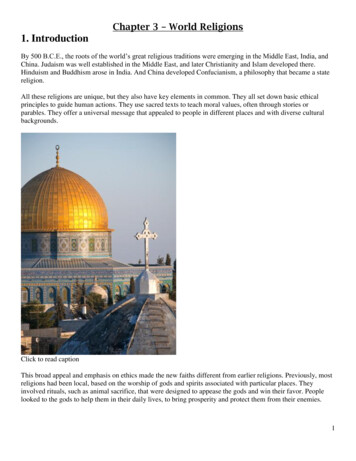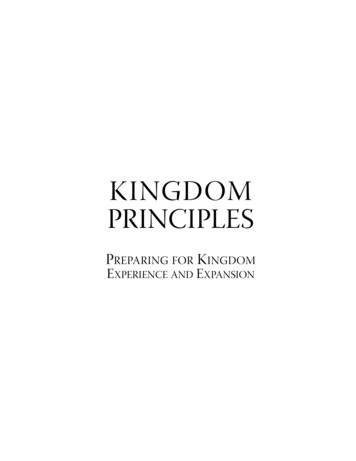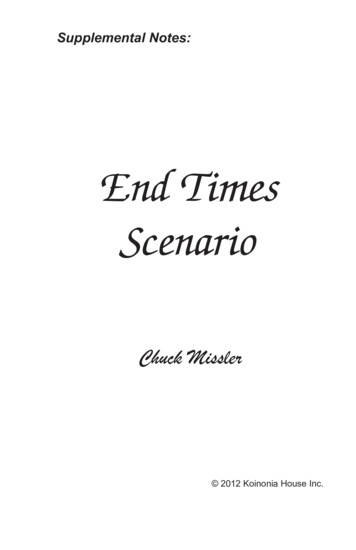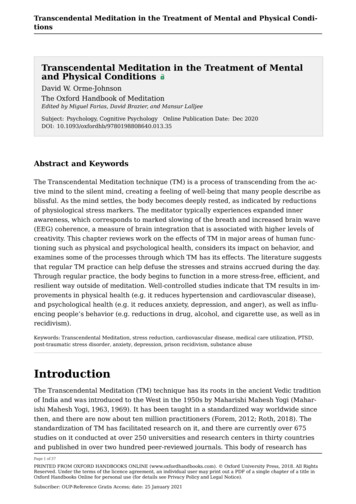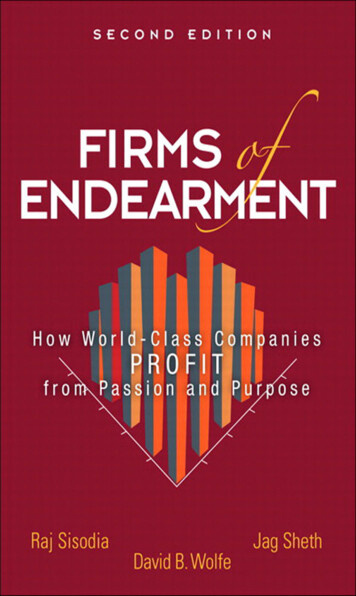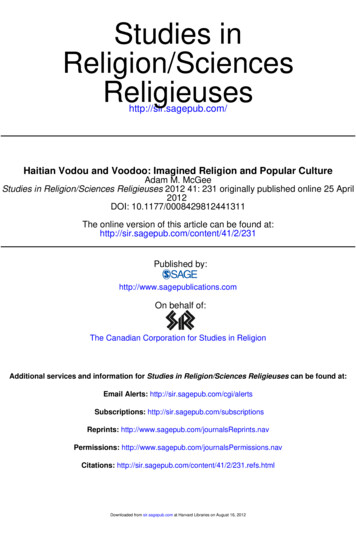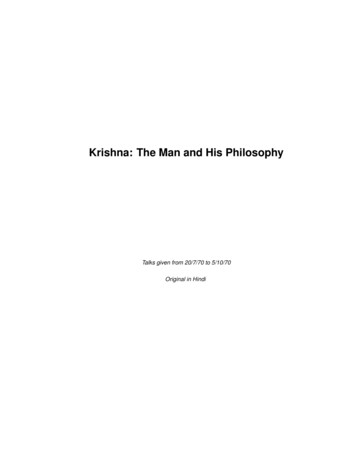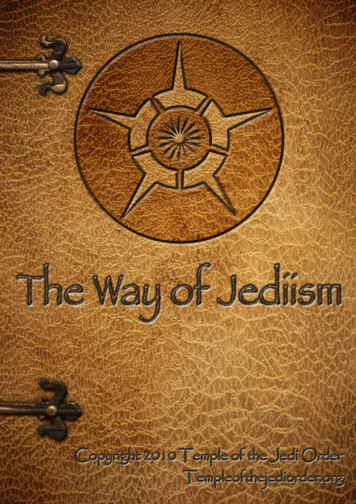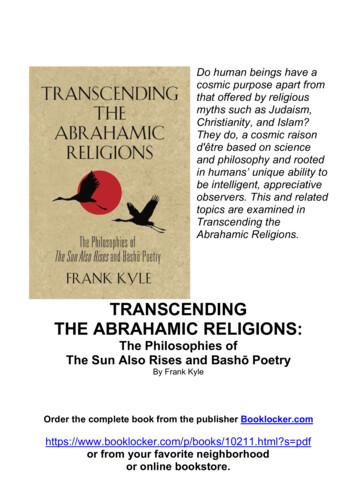
Transcription
Do human beings have acosmic purpose apart fromthat offered by religiousmyths such as Judaism,Christianity, and Islam?They do, a cosmic raisond'être based on scienceand philosophy and rootedin humans’ unique ability tobe intelligent, appreciativeobservers. This and relatedtopics are examined inTranscending theAbrahamic Religions.TRANSCENDINGTHE ABRAHAMIC RELIGIONS:The Philosophies ofThe Sun Also Rises and Bashō PoetryBy Frank KyleOrder the complete book from the publisher 0211.html?s pdfor from your favorite neighborhoodor online bookstore.
Copyright 2019 Frank KyleISBN: 978-1-64438-519-7All rights reserved. No part of this publication may be reproduced, stored ina retrieval system, or transmitted in any form or by any means, electronic,mechanical, recording or otherwise, without the prior written permission ofthe author.Published by BookLocker.com, Inc., St. Petersburg, Florida.Printed on acid-free paper.BookLocker.com, Inc.2019First EditionLibrary of Congress Cataloging in Publication DataKyle, FrankTranscending The Abrahamic Religions: The Philosophies of The Sun Also Risesand Bashō Poetry by Frank KylePHILOSOPHY / General RELIGION / Philosophy LITERARY CRITICISM /GeneralLibrary of Congress Control Number: 2019900152Cover design by Todd Engel
ContentsIntroduction . 9What’s It All About? . 14The Blume Revelations . 18Three Versions of The Sun Also Rises. 25Concluding Blume . 28War, Philosophy, and The Sun Also Rises. 31What is Nihilism? . 96Ethics as a Way to Prevent Chaos . 122Positive and Negative Ethics Revisited . 129Nihilism and Ethics . 132The War Validated Skepticism . 134The Nihilistic Lost Generation . 136Emotive Theory of Ethics . 141The Behavior of Men: Masculine and Feminine . 143Disorder: The Dominant Theme of the Universe . 149Jake’s Ethics: Summary and Conclusion . 153Rhetoric: Infidels and Niggers . 155Catherine Nixey’s Account of the Christian Destruction of ClassicalCivilization . 165Religion: A House Made of Words . 192Appreciative Awareness: Transcending Playfulness . 214The Worldview of Master Bashō . 224Works Cited . 241
IntroductionThe Sun Also RisesThis book is essentially about worldviews and words. ErnestHemingway’s novel The Sun Also Rises is a good place to begin because itdescribes the abrupt transition from an older worldview based onJudeoChristian theology to a post-Grand Narrative1 worldview andpostmodern way of life. World War I invalidated the religious worldview formany of those who experienced the war. It also called into question theprewar belief that societal evolution is progressive.2 Within the context of thestory, the characters exist in an intermediate state. In this case, thepostmodern condition is an intermediate condition like the one described byMatthew Arnold in his poem “Stanzas from the Grande Chartreuse”:Wandering between two worlds, one dead,The other powerless to be born,With nowhere yet to rest my head.It’s a troubled state of mind for those affected by the war because the futurehas become uncertain. The war itself suggested that the world to be bornmost likely will not be a happy one. We know that to be the case because weknow that the near future held the rise of Adolf Hitler and World War II.“With nowhere yet to rest my head” implies nothing to believe in thus nobeliefs to commit oneself to. The postmodern response of the characters is toembrace the carpe diem, an epicurean lifestyle: eat, drink, and be merry fortomorrow is uncertain. This condition threatens nihilism, the belief that lifehas no greater value than sensual satisfaction, which, as ArthurSchopenhauer warns, always leaves one dissatisfied yet sensual andemotional pleasure is all there is because there is nothing else to commitoneself to. The story, however, doesn’t leave the reader stuck in a nihilisticquagmire. It offers other meanings as profound as those offered by theJudeoChristian Grand Narrative, meanings based on reality rather thanfantasy.1 The Grand Narrative referred to here is the JudeoChristian story of the Universe, fromits beginning to its end. It’s all there in one book, the Bible. The narrative begins with theBook of Genesis and ends with the Book of Revelation. It’s a big story thus a GrandNarrative. From this point on, however, post-Grand Narrative is written post-Narrative.2 In the age of nuclear weapons the belief in social progress is dead; the reason being isthat in spite of other forms of progress, such as in medical science, World War III wouldnegate all progress by returning humanity to a new Stone Age.
TRANSCENDING THE ABRAHAMIC RELIGIONS10The Sun Also Rises also has a lot to say about language—the good, bad,and ugly. The ugly is revealed in Lesley Blume’s book Everybody BehavesBadly: The True Story Behind Hemingway’s Masterpiece The Sun Also Rises. Sheexplains how the novel was written with the intent of hurting people whodidn’t deserve to be hurt. The bad aspect of the novel is its use of disparagingethnic slurs such as nigger and kike. Yet, this bad aspect can become good if itmotivates the reader to rhetorically evaluate the purpose of such languageand the harm it causes.3 And in spite of Hemingway’s use of the novel to hurtmany of people he associated with in Paris, readers can put it to better use.The Abrahamic ReligionsFirst the worldview. The worldview of the three Abrahamic religionsis based on stories and personal, private revelations collected in the OldTestament, New Testament, and Quran. Judaism, Christianity, and Islam arethe triad of a single Grand Narrative that originated with the ancient Jewsand refurbished by the writers of the Gospels and Muhammad. The storybegins with God, Yahweh, creating the world and all the species in six days,though later he would flood it destroying all life but a boatload. The storyfinally comes to an end with the destruction of most of the world. For theJews the end will come with the arrival of the Messiah who will implementthe Messianic Era that will establish global peace and harmony and be ruledby the people of Israel. For Christians and Muslims the end comes withJudgment Day and the sentencing of most people to the fires of Hell andrewarding stalwart followers with eternal life in some form of paradise. Theevidential problem with the trio’s worldview is that it’s based on mythologythat originated over three thousand years ago and is derived from theimaginations of prophets rather than empirical reality. And even if the mythwere true, it doesn’t offer a happy ending for the world (some form ofArmageddon) or for nonbelievers, the vast majority of humanity, who willspend an eternity or a very long time in the fires of Hell.4After reading Blume I doubt that was Hemingway’s intention.Just before the arrival of Jesus the wise Roman poet-philosopher Lucretius tried toalleviate people’s dread of the afterlife by telling them there was nothing to fear because afterdeath the atoms of the body disperse. Then came along Christianity and Islam to elevatedread to terror. In the Gospel of Matthew Jesus warns, “It is better for you to enter into lifemaimed or crippled than with two hands or two feet to be thrown into eternal fire” (18:8). Inthe Quran threats of burning in Hell is a constant refrain. Here is one: “Garments of fire willbe tailored for those who disbelieve; scalding water will be poured over their heads, meltingtheir insides as well as their skins; there will be iron crooks to restrain them; whenever, intheir anguish, they try to escape, they will be pushed back in and told ‘Taste the suffering ofthe fire’” (22:19-20). These ideas have haunted people for centuries. Once an idea gets into aperson’s head it’s hard to get rid of it. Of course, the purpose of this horrific language is to34
The Philosophies of The Sun Also Rises and Bashō Poetry11What characterizes the Abrahamic scriptures most is the language ofhate. The Old Testament declares pagans to be the enemies of God, and assuch they have no moral rights. Thus they can be conquered, robbed,murdered, and enslaved with not only God’s approval but encouragement. Inthe Old Testament and Quran he even joins the fight. In the New TestamentJesus tries to transform the old hateful Judaism into a religion of love andcompassion, but his religion of peace was hijacked and then buried by thewriters of the New Testament, men who were temperamentally very muchlike traditional Jews, full of hate and animosity. They corrupted Jesus’message of creating a better world in the here and now with a differentmetaphysics: a man-god savior and eternal life in Heaven or Hell. The OldTestament was a declaration of war on pagans but primarily those within theboundaries of the Promise Land. The New Testament declares global war onJews and pagans. Relevant here is the fact that none of the writers of the NewTestament actually knew Jesus.Catherine Nixey’s book The Darkening Age: The Christian Destruction ofthe Classical world describes in great detail the destruction and killingJudeoChristians engaged in during their bloody rampage against classicalpagan civilization. She calls these JudeoChristians “destroyers.” What I wantemphasize though is the cause of the hatred that inflamed their desire todestroy: language, the language of the Old Testament and New Testament.These scriptures, religious ideologies that are nothing more than collectionsof words, were used to program susceptible minds. Once programmed,believers became tools, destructive tools that served political and religiousauthorities. The revelation here, which could not be fully comprehended untilthe advent of computers and robots, is that language can program humansjust as COBOL, ALGOL or Fortran can program robots. Robots can beprogrammed to be good, helpful Robots like C-3PO, R2-D2, or Robby theRobot or evil robots like the first Terminator or HAL. It’s all about languageand programming.The Quran is also a declaration of war (jihad) on pagans or really allnon-Muslims (including the other two members of the Abrahamic trio). Allahsays, “As for those who disbelieve and die disbelievers. These will have apainful torment, and will have no saviors” (3:91). This is the warning toMuslims who are considering giving up their faith: “As for those whodisbelieve after having believed, then plunge deeper into disbelief theirrepentance will not be accept; these are lost” (3:90). This means they will burnin the fires of Hell. The main message of the Quran is that “God rejects thoseuse fear to encourage conversion or to discourage thoughts of quitting the religion. These areillustrations of how language can be used to terrify.
TRANSCENDING THE ABRAHAMIC RELIGIONS12who disbelieve” (2:89) and “We destroyed those who denied Our revelationsand would not believe” (7:72). The harm caused here results from declaringcertain people enemies of God. As such, in the eyes of believers they areworthless and have no moral rights. This is explained and illustrated below.In addition, the Quran makes it clear that Islam’s great ambition isglobal conquest: “It is He [Allah] who sent His Messenger (angel Gabriel)with the guidance and the religion of truth, in order to make it prevail overall the religions, even though the idolaters dislike it” (9:33) and “Say to thosewho disbelieve: if they desist, their past will be forgiven. But if they persist,then it is well known what happened with the people of the past. [Allahpunished them.] Fight them until there is no more persecution, and religionbecomes exclusively for Allah.” (8:38-39). Muhammad was Allah’s firstmilitary commander. He commanded the early aggression againstnonbelievers, pagans, and Jews. And after his death, Islamic conquests ofother nations continued for centuries. Even our century has witnessed thelegacy of the Quran in the rampages of the Islamic State and numerousIslamic attacks in Europe, the U.S., and elsewhere.Matsuo Bashō’s PoetryThe worldview of Bashō’s poetry is rooted in immediate livedexperience shared by all human beings.5 It really doesn’t extend beyondimmediate experience. The beginning and end of the Universe isunimportant. What is important are the entities— animate and inanimate –ofthe mundane world that exist within the range of one’s perception. There is,furthermore, no condemnation or hatred in his poetry. All things are equalsimply because they are finite and mysterious. Here’s an illustration:a peasant’s childhusking rice, pausesto look at the moon.The poem captures three important elements of human existence: thenecessity to work and the mystery and beauty of nature. The world ismysterious to the child, as it should be to adults. Yet, the practical duties ofdaily life tend to cause adults to lose their childhood fascination with theworld. To truly appreciate the world one must see it as a child would.Ultimately the Universe and all its inhabitants are mysterious even if weknow scientifically how they came to be. The mystery captured by this poemAs oppose to the supernaturalism of the Abrahamic regions, which is based on therevelatory experiences of a few prophets.5
The Philosophies of The Sun Also Rises and Bashō Poetry13is the existence of the moon and the child and their relationship: the moon asthe object of enthralled awareness. It is a symbiotic relationship. Without thechild, here representing all of humanity, the moon would remain unknownand unappreciated. Without the moon, representing all of nature, the childwould be denied the opportunity to be an appreciative observer.In Bashō’s poetry there is no animus or hatred. No ideology, religiousor secular. No escaping reality into an ego- inflating fantasy world. Nosuggestion that other worldviews are unacceptable. No words denigratingpeople who believe differently or words provoking violence against them. Nosuggestion of nature’s being a subordinate reality. What Bashō offers throughhis poetry is how to achieve a fulfilled life by living peacefully andappreciatively.
Do human beings have acosmic purpose apart fromthat offered by religiousmyths such as Judaism,Christianity, and Islam?They do, a cosmic raisond'être based on scienceand philosophy and rootedin humans’ unique ability tobe intelligent, appreciativeobservers. This and relatedtopics are examined inTranscending theAbrahamic Religions.TRANSCENDINGTHE ABRAHAMIC RELIGIONS:The Philosophies ofThe Sun Also Rises and Bashō PoetryBy Frank KyleOrder the complete book from the publisher 0211.html?s pdfor from your favorite neighborhoodor online bookstore.
The Sun Also Rises This book is essentially about worldviews and words. Ernest Hemingway’s novel The Sun Also Rises is a good place to begin because it describes the abrupt transition from an older worldview based on JudeoChristian theology to a po
